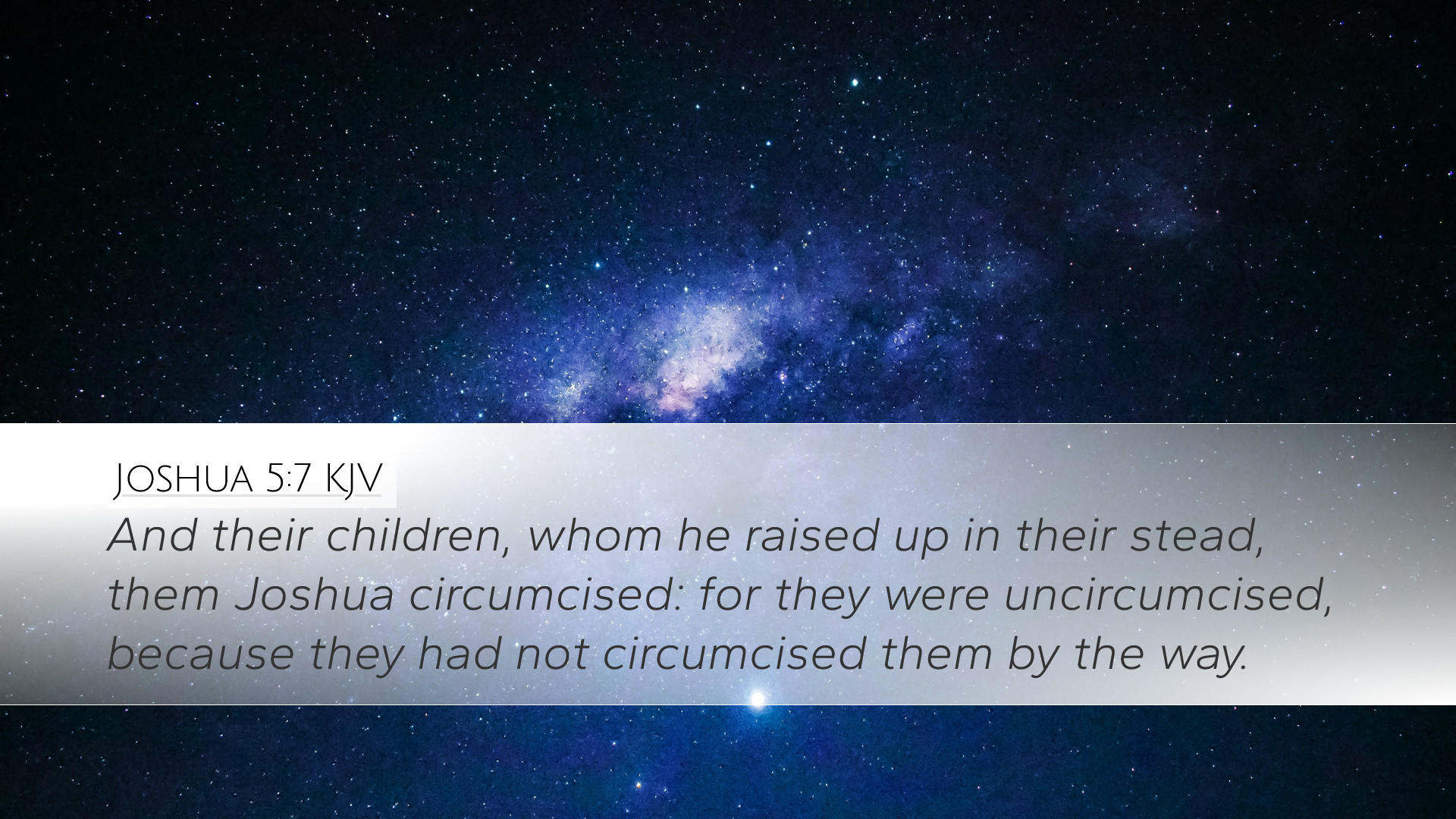Old Testament
Genesis Exodus Leviticus Numbers Deuteronomy Joshua Judges Ruth 1 Samuel 2 Samuel 1 Kings 2 Kings 1 Chronicles 2 Chronicles Ezra Nehemiah Esther Job Psalms Proverbs Ecclesiastes Song of Solomon Isaiah Jeremiah Lamentations Ezekiel Daniel Hosea Joel Amos Obadiah Jonah Micah Nahum Habakkuk Zephaniah Haggai Zechariah MalachiJoshua 5:7
Joshua 5:7 KJV
And their children, whom he raised up in their stead, them Joshua circumcised: for they were uncircumcised, because they had not circumcised them by the way.
Joshua 5:7 Bible Commentary
Commentary on Joshua 5:7
Joshua 5:7 states: "And their children, whom he raised up in their stead, them Joshua circumcised: for they were uncircumcised, because they had not circumcised them by the way." This verse reflects a critical moment in the history of Israel as they transition from the wilderness into the Promised Land. It highlights the importance of covenant and obedience to God’s commands.
Contextual Overview
This passage follows the miraculous crossing of the Jordan River and precedes the Israelites’ first encounter with the city of Jericho. The act of circumcision establishes not only physical identity but also spiritual allegiance to God's covenant.
Theological Significance
Joshua 5:7 emphasizes several key theological themes:
- Covenant Renewal: Circumcision was a sign of the covenant made with Abraham (Genesis 17:10). This act signifies a renewal of that covenant among the new generation.
- Identity Formation: The children of Israel had been born in the wilderness and had not received the sign of the covenant due to the previous generations' disobedience and lack of faith. This ritual marks their acceptance into God’s people.
- Obedience to Divine Command: God commands His people to maintain the sign of the covenant, illustrating the necessity of obeying God’s laws as they prepare to conquer the land.
Insights from Commentaries
Matthew Henry's Commentary
Henry notes the importance of tradition and the visible sign of the covenant in maintaining faith among God's people. He emphasizes that the new generation must comprehend their identity and purpose in relation to God’s promises. Without this act of circumcision, the children of Israel would have faced the potential of appearing as mere wanderers rather than a people under covenant.
Albert Barnes’ Notes on the Bible
Barnes highlights the necessity of the act as a means of setting apart the children of Israel. He indicates that the failure to circumcise prior to this event reflects the disobedience of the previous generation, setting a stark contrast between their experiences and the current generation’s readiness to follow God. He argues that this act served as an important reminder to the new generation that they are heirs to the promises made to their forefathers.
Adam Clarke's Commentary
Clarke delves into the implications of circumcision as a spiritual act rather than merely a physical one. He suggests that it symbolizes the necessity of spiritual circumcision — a cutting away of sin and a marking of one’s life as dedicated to God. Clarke connects this to the fulfillment of God's promises, noting that the act of circumcising the children of Israel was vital for entering into God's blessings in the land flowing with milk and honey.
Application for Today’s Believers
From this commentary, several applications emerge that are relevant for pastors, theologians, and lay believers:
- Covenantal Identity: Believers today are called to understand their identity in Christ. Just as circumcision marked the Israelites as God’s people, baptism serves as the New Testament sign of faith and commitment.
- The Call to Obedience: The act of obeying God’s commandments remains crucial. Jesus emphasizes the importance of following His commands as an expression of love (John 14:15).
- Spiritual Renewal: Clarke’s observation about spiritual circumcision can be applied today in the context of personal holiness and moral integrity. Believers are urged to cut off sinful practices that hinder their walk with God.
Conclusion
Joshua 5:7 serves as a profound reminder to the church of the importance of covenantal faithfulness and the necessity of living as set apart for God’s purposes. The act of circumcision is not merely an ancient ritual but reflects the ongoing need for believers to understand their identity in God, to embrace obedience as a reflection of their faith, and to continually engage in spiritual renewal as they walk in their faith journey toward the promised fulfillment in Christ.


